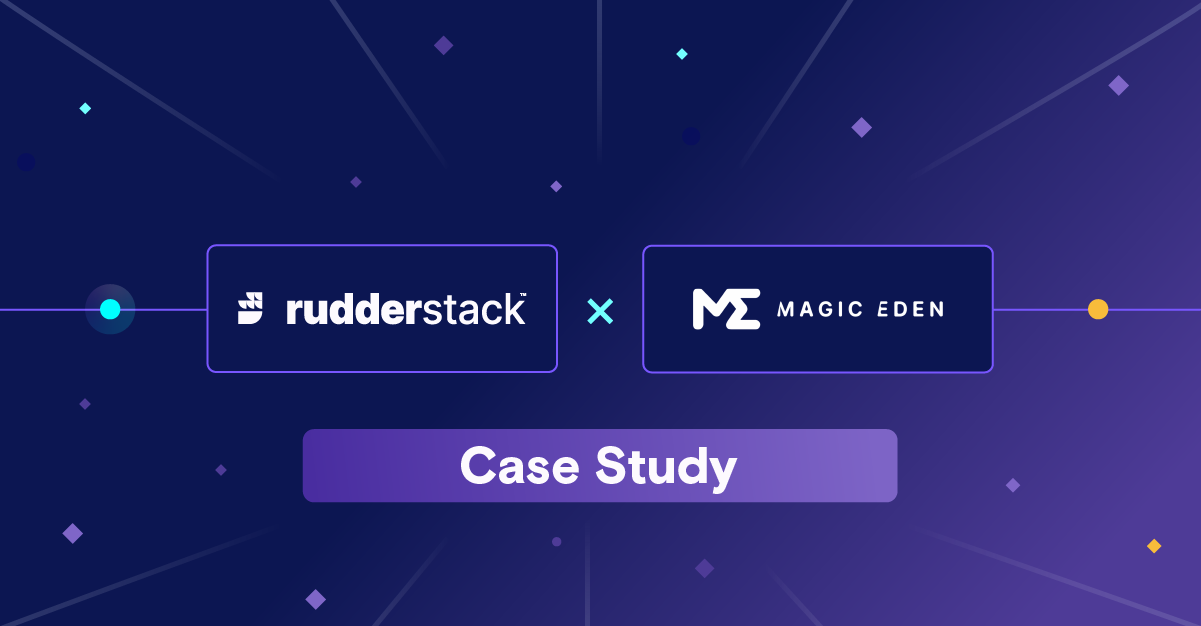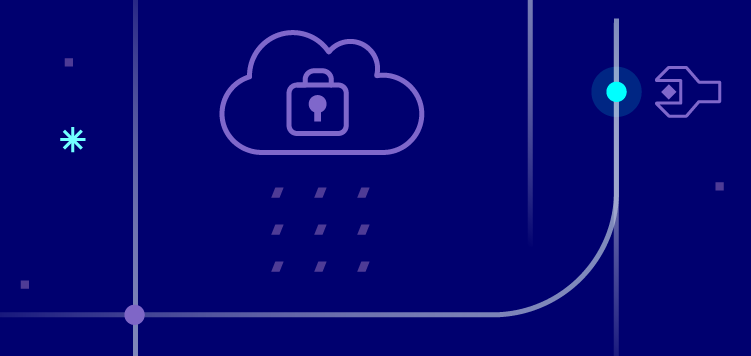🗓️ Live Webinar November 9: How HealthMatch.io Used Customer.io and RudderStack to Launch Their New Business Model in 24 Hours
Blog
PRODUCT
How Magic Eden Grew Its Market Share to 95% of the Solana NFT Ecosystem Using RudderStack


Subscribe
We'll send you updates from the blog and monthly release notes.

Kristen Glass
Director of Product Marketing at RudderStack
June 23, 2022
Highlights
- RudderStack gave Magic Eden the tools to track user behavior within days of launching the product.
- RudderStack integrates with Databricks Delta Lake and AWS S3, allowing Magic Eden to store, process, and query vast quantities of structured and unstructured data using NoSQL technologies.
- RudderStack’s customizability, scalability, and deep visibility into user behavior have given Magic Eden the tools to scale as the Solana and NFT ecosystems grow.
Key Stats
- Magic Eden deployed RudderStack within 24 hours and started to send user events into their data lake within 30 minutes.
- Magic Eden uses RudderStack to improve the user experience by tracking 30 different events.
- Magic Eden grew its market share to 95% of the Solana NFT ecosystem in six months using RudderStack.
- RudderStack customizations provide 100% user visibility versus 25% with off-the-shelf products.
- Magic Eden’s engineering and analytics teams save three days of integrations and data clean-up time per month using RudderStack.
“Magic Eden is a virtual entity in the crypto/NFT space. Every click, keystroke, and tap on our website and app is a touchpoint that can be captured, tracked, and analyzed to improve the user experience and our product offering. It integrates seamlessly with our NoSQL environment to process vast quantities of structured and unstructured data. RudderStack has futureproofed our platform in the fast moving cryptocurrency space, where change is measured in hours and days.”
– Hayden Ng Head of Analytics, Magic Eden
Overview
Magic Eden is the world’s number one NFT marketplace using the Solana blockchain. A Web3-first business, the company was founded in September 2021 to leverage the benefits of the Solana cryptocurrency, including speed, scalability, and open infrastructure, resulting in higher transaction volumes and lower fees than the competing Ethereum coin.
The company’s flagship product is Launchpad, a service that allows creators to launch and mint NFT collections on the Magic Eden site instead of hosting them on their own infrastructure. Magic Eden also hosts a secondary marketplace that recently surpassed $1 billion in trading volume. Its intuitive interface and active user community have attracted 21 million monthly active user sessions and 10,000 wallets linked to the platform to mint and trade NFTs.
Challenge: Understanding Customer Behavior on a Freshly Minted NFT Marketplace
Magic Eden is a purely virtual entity. There are no fulfillment centers, and the company does not sell any physical products. The entire customer journey happens online, and users are both buyers and sellers of NFTs. Every click, keystroke, and tap on its website and app is a touchpoint that can be captured, tracked, and analyzed to improve the user experience and product offering.
To fully grasp how the NFT creators and collectors interact, Magic Eden sought a customer data platform that offered deep visibility into site user data while at the same time protecting customer privacy. Given its accelerated growth, the company also needed a CDP that could scale quickly to accommodate an explosion in activity.
“We want to understand how customers engage with our platform,” says Magic Eden’s Head of Analytics, Hayden Ng. “We want to know how users make purchase and trade decisions, what they do before buying something, how often they look at an NFT, and how they place bids.
“We’re barely out of the starting block,” he adds. “We are new to the NFT space, and this is a young market. There’s so much potential, and we need a platform that can keep pace with our growth potential.”
Hayden admits that the search for a CDP was all too brief. “Practically, there were two contenders,” he says. “Segment and RudderStack.” He goes on to explain that Segment fell quickly to the wayside. “We’re a cryptocurrency company, and data security is important to us. Segment stores our customer data in their database whereas RudderStack allows us to encrypt and route it directly to our data lake.”
The other concern was the speed of implementation. Magic Eden went from concept to rollout in a couple of weeks, and RudderStack’s API-based CDP was easier to integrate into the company’s workflow than Segment’s UI-based platform.
Solution: A Flexible Warehouse-First Customer Data Platform
Magic Eden’s engineers deployed RudderStack in 24 hours and started to send user events into its data lake within 30 minutes. The company’s website resides in staging and production environments that run on MongoDB and a data warehouse that lives on Amazon S3 buckets accessed via the Databricks File System. This NoSQL setup is flexible, scalable, and can store, process, and query vast quantities of structured and unstructured, easy-to-understand data.
RudderStack’s built-in Amazon S3 integration securely collects user events from Magic Eden’s website and converts them into a format that leads to actionable insights: “Data quality is always a challenge,” says Ng. “You have to make sure it’s clean and usable by the business. With RudderStack, our data is always ready to be used. The integration is seamless, and we’ve never had any data quality issues. That’s huge for us,” Ng continues. “RudderStack gave us Magic Eden an edge out of the gate, and we understood our users within a few days of launching.”
Before deploying RudderStack, Magic Eden could only track page loads. The company now securely tracks 30 different events and can determine where website traffic comes from, how site visitors use various features, and where user traffic originates. “When people go to LaunchPad,” Ng continues, “We can tell if they’re coming from a specific NFT project’s website, whether they clicked on a Twitter link or were browsing our marketplace. Understanding these use cases and how users engage with our products makes it easier to keep ahead of NFT and cryptocurrency trends. Change is the only constant in this business.”
Collecting user metrics is complicated by the nature of Magic Eden’s business. Unlike visitors to traditional eCommerce sites, Magic Eden customers don’t create user accounts using credentials like e-mail addresses, making it impossible to track them using site-specific identifiers. Instead, they log in with their cryptocurrency wallets, so the company had to find another way to connect session IDs and IP addresses to individual users.
RudderStack’s flexibility allowed Magic Eden to custom-code an integration that matched event data to site visitors’ cryptocurrency wallets. “We can’t track user behaviors using IP addresses and session IDs,” explains Ng. “You can have ten session IDs and three different people using the same IP, and there’s no way of distinguishing who’s who and who’s doing what. RudderStack allowed us to match event data to unique users while respecting their privacy. We couldn’t do that by pointing and clicking with Segment. Connecting our CDP to our crypto wallet APIs gave us an edge out of the gate, and we were able to understand our users within a few days of launching.”
Results: The Flexibility to Adapt to a Changing NFT and Cryptocurrency Landscape
Within six months of going online, Magic Eden grew its market share to 95% of the Solana NFT ecosystem. The company continues to refine its product offering, and Ng attributes this success to RudderStack’s speed and ease of implementation. “RudderStack is not just off the shelf. It’s customizable, and we can add traits from our website to the event feed that gets fired and streamed into our database. We have implemented RudderStack options that have taken customer visibility on our site from 25% to 100%.”
“We have an incredible team of engineers,” Ng explains. “They rolled out RudderStack in a day and then went back to what they do best: building the right tools, products, and features for our customers. With any other CDPs, our engineers would have to spend a lot of their time coding and maintaining behavioral tracking and analytics tools. Now, they wait for our analytics team to break down site visitor data and supply metrics that will drive changes to our website.”
Ng also appreciates RudderStack’s flexibility. “It’s not just off the shelf,” he says. “It’s customizable, and we can add traits from our website to the event feed that gets fired and streamed into our database.”
RudderStack’s speed of implementation, customizability, scalability, and deep visibility into event data have given Magic Eden a solid foundation to pivot in the rapidly evolving NFT and cryptocurrency space. Solana’s recent move into digital payments is driving interest in the coin, and Ng is looking forward to welcoming new users to Magic Eden’s platform.
“Solana lowered the barrier for creators and collectors by reducing transaction fees and speeding up processing time. Solana Pay is drawing more people to the Solana ecosystem, and thanks to RudderStack, Magic Eden is ready for them,” concludes Ng.
Magic Eden Data Stack
Destinations: S3 Data Lake, Databricks Delta Lake
Sources: JS SDK, React SDK, Node SDK
Warehouse: S3 Data Lake, Databricks Delta Lake

ABOUT THE AUTHOR
Kristen Glass
Director of Product Marketing at RudderStack
Recent Posts

Subscribe
We'll send you updates from the blog and monthly release notes.

Get started today
Start building smarter customer data pipelines today with RudderStack. Our solutions engineering team is here to help.
This site uses cookies to improve your experience. If you want to learn more about cookies and why we use them, visit our cookie policy. We’ll assume you’re ok with this, but you can opt-out if you wish Cookie Settings.




